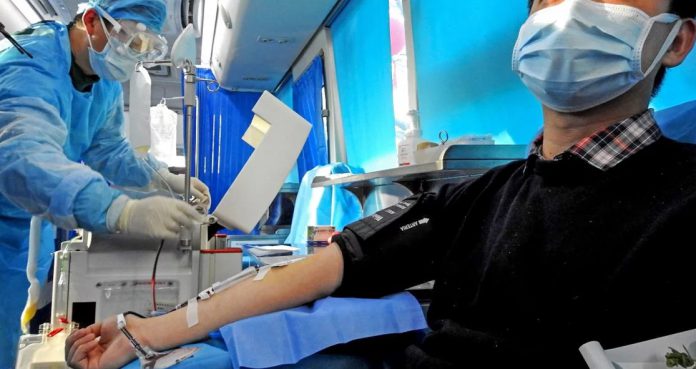On Monday, a Chinese professor said doctors in Shanghai have been using plasma therapy to treat the new coronavirus, which is now officially known as COVID-19.
The doctors are using infusions of blood plasma from those who have recovered from COVID-19 to treat people who are still having the infection. They reported promising preliminary results with this type of treatment.
Dr. Mike Ryan, head of the WHO’s Health Emergencies Program, said that using plasma therapy was a “very valid” approach to treat COVID-19. However, the health organization said it is important to get the timing right to boost a patient’s immunity.
The coronavirus outbreak, which started in Wuhan, China, in December, has affected more than 73,000 and killed 1,874 people, globally, so far. On Monday, Shanghai reported 332 confirmed cases, with one death in recent weeks.
Co-director of the Shanghai Public Health Clinical Centre, Prof. Lu Hongzhou, said 184 cases were still hospitalized, of which 166 were mild cases and 18 were serious.
Prof. Hongzhou said the medical center has set up a special clinic to treat patients with plasma therapy. The doctors were selecting patients who were willing to donate. The patients’ blood is screened to check where they have other diseases such as hepatitis B or C.
“We are positive that this method can be very effective in our patients,” said Prof. Hongzhou.
Currently, we do not have a specific treatment to treat COVID-19 or a vaccine to prevent the disease. And the process of developing and testing drugs or vaccines could take months or even years.
The plasma therapy, aka “convalescent” plasma, has been found “effective and life-saving” against other infectious diseases, such as diphtheria and rabies, according to Dr. Ryan.
“It is a very important area to pursue,” continued Dr. Ryan. “Because what hyperimmune globulin does is it concentrates the antibodies in a recovered patient. You are essentially giving the new victim’s immune system a boost of antibodies to hopefully get them through the very difficult phase.”
“So it must be given at the right time because it mops up the virus in the system, and it just gives the new patient’s immune system a vital push at the time it needs it. But it has to be carefully timed and it’s not always successful,” he told reporters in Geneva.
Dr. Ryan added, “So it is a very important area of discovery, and I believe they are starting trials on that in China. But it is a very valid way to explore therapeutics, especially when we don’t have vaccines and we don’t have specific antivirals.”
In addition to using plasma therapy, the doctors have been trying two antiviral drugs to see whether they can help treat COVID-19. The Wuhan Institute of Virology has teamed up with Gilead Sciences to check whether remdesivir, an antiviral drug, could help treat the infection.























